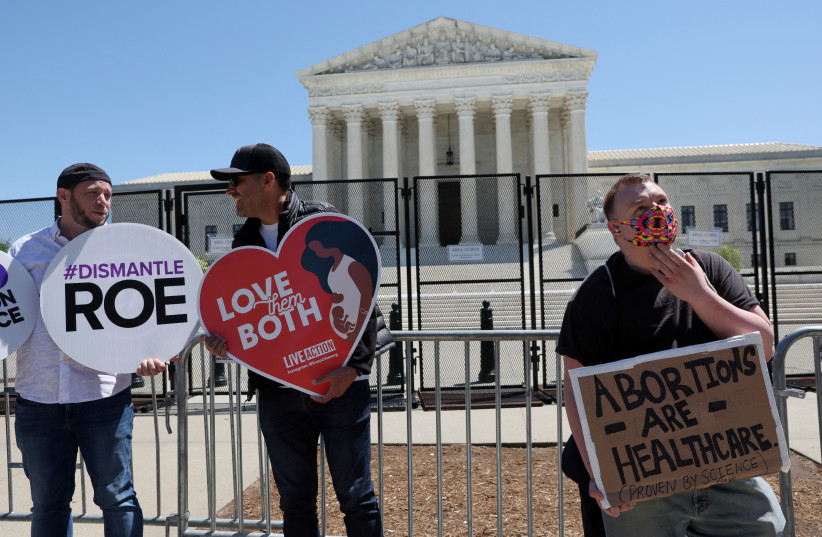Pro-choice American expats living in Israel are set to rally for abortion rights on Tuesday in front of the US Embassy Branch Office in Tel Aviv.
For more stories from The Media Line go to themedialine.org
The event, organized by the Israeli chapter of Democrats Abroad, is timed to coincide with the National Council of Jewish Women’s “Jewish Rally for Abortion Justice,” an event set to take place in Washington, DC the same day.
It is also part of the “Bans Off Our Bodies” rallies taking place in major cities around the world on the heels of a leaked draft Supreme Court opinion that would overturn the 1973 Roe v. Wade decision. The leaked draft opinion showed that five of the court’s nine justices had voted to reverse the ruling.
“If Roe v. Wade falls then many other rights will fall,” Heather Stone, vice chair of Democrats Abroad Israel, told The Media Line. “For many of us who are living outside the United States, it’s distressing to see that our rights are being so curtailed [there] compared to the rights that are available to us in the host countries where we live.
“Even some of the Catholic countries recently liberalized their [abortion] laws, like Ireland, Mexico, and Argentina,” she added. “The United States is definitely going in a very different and backward direction.”

The approach toward abortion in Israel contrasts sharply with that of the US. Abortion was officially legalized in Israel in 1977; however, women can only undergo the procedure following approval from a committee. This is granted in the vast majority of cases.
Jewish law permits abortion under certain circumstances and does not share the view that fully protected human life begins at conception; instead, a fetus attains personhood only at birth. The Talmud even states that before 40 days of gestation, the embryo is “mere water.”
Stone expressed concern that other rights, such as gay marriage and contraception, would be rolled back shortly after Roe v. Wade is overturned.
“It’s going to undo all of the liberal privacy rights that we have relied upon for years,” she asserted. “A strong majority of the American public is in favor of abortion rights. Over 70% believe in a right to choice and that includes people who are Republicans and independents.”
Marc Zell, chairman of Republicans Overseas Israel and a vice president of Republicans Overseas International, told The Media Line that most Republicans are not against abortion per se but view the landmark Roe v. Wade ruling as being severely flawed.
“Most of our constituents in Israel were pleased to see that the Supreme Court appears to be on the verge of rectifying the constitutional disaster that was Roe v. Wade – and this is not to say anything about the merits of being pro-life or pro-choice,” Zell said. “The issue is whether the Supreme Court acted correctly under the US Constitution in fashioning under the clear blue sky a constitutional right to have an abortion prior to viability.”
Should the ruling be reversed, the abortion issue would be returned to the states and localities, enabling them to decide how they want to proceed with it, he noted.
“Many Republicans favor the right of a woman to elect to have an abortion prior to viability or maybe at other times,” Zell said. “The real problem that most Republicans have is the methodology by which this right was protected. It was done by this unilateral act of the Supreme Court, fashioning a constitutional right out of thin air.”
Last week, the White House warned that there is a risk of a nationwide ban should Republican lawmakers regain a congressional majority in the upcoming midterm elections.
Moshe Chertoff, vice chair for media and policy at Democrats Abroad Israel, told The Media Line that he would be driving in from out of town to Tel Aviv to take part in Tuesday’s rally.
“I have a responsibility to my daughters, to the daughters of my friends, and to the women of America,” Chertoff said. “In the Supreme Court, it will be mostly men making a decision and men must be heard on this issue.”
Chertoff, who took part in the American civil rights movement in the 1960s, said that he witnessed the evolution of US democracy and had hoped that the playing field had already been leveled in terms of certain rights.
“Down the line, this will also be a struggle about states’ rights, in which case we wouldn’t want the disintegration of the federation into two United States of America, one which is blue and one which is red or however you want to look at it,” he said. “There are certain things that should be universal for all Americans.”
Although the practice is legal and not a major point of debate there, abortion opponents in Israel are hoping that US policy could eventually shift the momentum in their favor.
Sandy Shoshani, national director of the Be’ad Chaim, a pro-life association based in Jerusalem, told The Media Line that she hoped the debate in America would lead Israelis to “think twice” about whether abortion is the right thing to do.
“In Israel, it’s a non-discussion and it’s not even a question,” she said. “People are not considering that the [fetus] is a human being. A baby in Israel has no legal rights until birth.”
Shoshani revealed that her organization recently sent a petition to the Israeli Supreme Court in a bid to restrict abortion after 24 weeks of gestation, at which point doctors generally consider a fetus to have a chance of survival. They expect to receive an answer sometime next month.
Zell, however, is not of the opinion that American abortion views will have any impact on the Israeli perspective.
“The Israeli approach is based on science and Jewish law, which takes a far different position about the right to abortion than does the American law or under Christian traditions,” he said.
